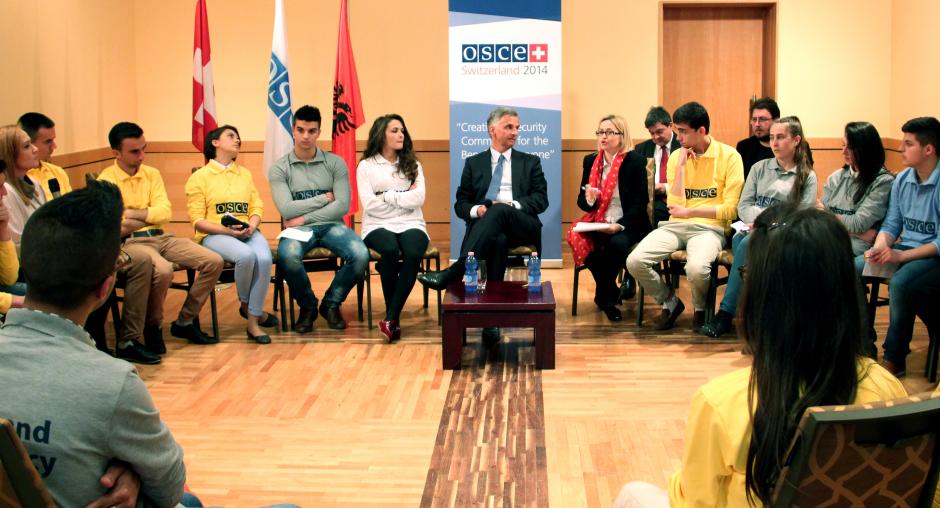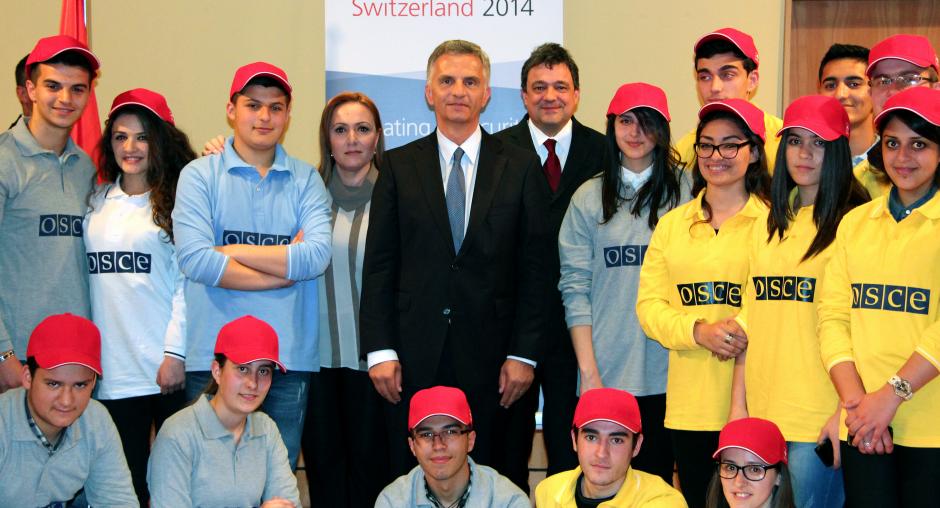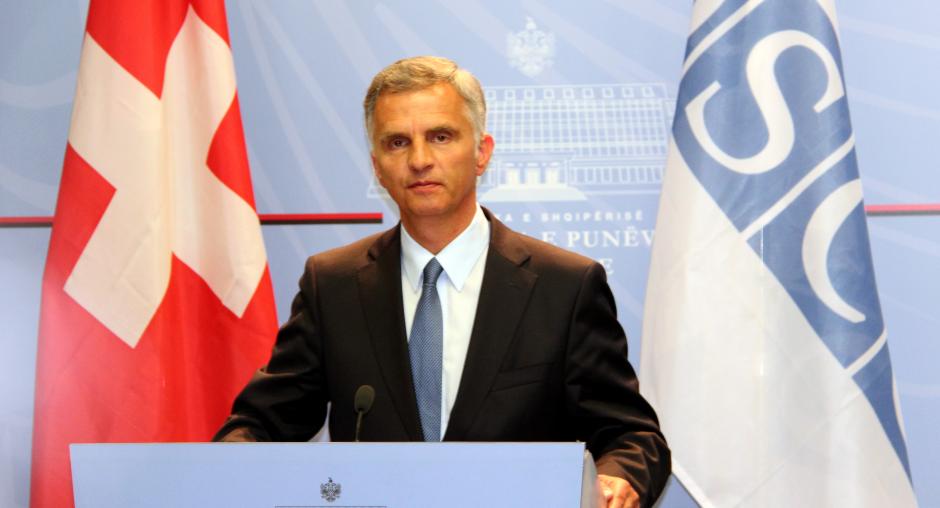Albanian students discuss democracy with OSCE Chairperson-in-Office
What is democracy? Does it have the same meaning to a 17-year-old student from a small Albanian town and to the man who chairs the world’s largest regional security organization?
Such a student, Ledion Onuzi, had the opportunity to ask OSCE Chairperson-in-Office and Swiss President and Foreign Minister Didier Burkhalter directly, during a meeting with 30 high school students during Burkhalter’s visit to Tirana on 24 April 2014.
Democracy is, above all, respect for everybody. It is an opportunity for everyone to participate in the search for a solution. Democracy also means inclusiveness and responsibility.
Didier Burkhalter, OSCE Chairperson-in-Office and Swiss President and Foreign Minister
Burkhalter was meeting alumni of a civic education project run by the OSCE Presence in Albania. Project participants learned how institutions work and how to become active citizens, and were trained in debate. They also visited and had discussions with Albania’s President, Assembly Speaker and Deputy Prime Minister as part of the project.
From Ukraine to Brazil
It was a chance for the students to put a variety of questions to Burkhalter, from advice on their future careers and ways to lower unemployment among young people, to the recent crisis in Ukraine and the contribution that Albanian immigrants make in Switzerland, including Albanian players in the Swiss national football team.
I want to study political science. What advice would you have for a future career?
Burkhalter: Think about your career, but not only. Think particularly about what you can do for others. You have to be modest if you want to engage in politics. If you just think about yourself, you won’t be able to create value for others. I can give you a tip: politics is about ideas, about imagining the future and finding better solutions for the next generations. Just think very strongly about the ones you love the most – hence you will find the best ideas.
Unemployment is one of the biggest problems in Albania. Would Switzerland be willing to offer training, at least to Albanian youngsters, who could then return and use those skills in Albania?
Burkhalter: The best way would certainly be to improve the training system for youngsters in your own country. Switzerland’s system is closely aligned with the needs of the economy – the so-called “vocational education and training”. We can help countries like yours in a situation where there is high youth unemployment above all by exchanging experiences. The commitment and engagement of Swiss corporations that operate in your country is also important, as they provide training to Albanian youngsters along the lines of the Swiss training system.
Your agenda has been recently busy with the political crisis in Europe and escalation of violence in Ukraine. Do you see these as signs of instability in Europe? Do they show that peace and stability should not be taken for granted? If yes, how do you see role of the OSCE?
Burkhalter: The situation in Ukraine is precarious. The role of the OSCE – an organization that aims to create security through co-operation and dialogue and not through force – is thereby very important. The OSCE is the only international organization which has a mandate to monitor the situation on the ground, report, establish contacts with and facilitates dialogue among local, regional and national authorities, civil society, ethnic and religious groups, and members of the local population. I am sure that the OSCE is well positioned to assist in resolving the crisis through peaceful manners.
I come from the Roma community. What are your plans for ensuring security and fighting discrimination of Roma?
Burkhalter: The OSCE does a lot of work in different countries to ensure the protection of national minorities. Education plays an important role in this regard. In my opinion, access to schooling and education is essential for all young people, including from the Roma community. I have been visiting some projects and have noticed how important they are. This is why I would like to strengthen the activities by the Swiss Agency for Development and Cooperation in this regard.
How do you see the Swiss national team without the Albanian football players?
Burkhalter: Not as good! The Swiss football time is a good example for the working integration of young people born from different origins in Switzerland. We need many different talents and skills to excel - together we now have a chance in Brazil [2014 FIFA World Cup] to become World Champions.
Model OSCE
Burkhalter told the students that one priority of the Swiss OSCE Chairmanship in 2014 is to strengthen the voice of young people and to enhance their involvement within OSCE structures. To achieve this goal Switzerland is organizing a Model OSCE series in which young men and women between ages of 18 and 30 from the OSCE participating States were invited to take part.
The participant from Albania, Luis Bekteshi, was present to share his experiences with the Chairperson-in-Office and with the high school students. “An unforgettable experience! Hard, but impressive work by 57 youngsters from OSCE participating States,” Luis said. Together with the other 56 “Youth Ambassadors” Luis will remain involved in the activities of the Swiss OSCE Chairmanship throughout the entire year, get familiar with the OSCE structures and develop his skills in diplomacy and negotiation. The aim is to develop a “Youth Action Plan”, which will be presented to the foreign ministers of the OSCE during the Ministerial Council 2014 at the end of the Swiss Chairmanship year in Basel.











